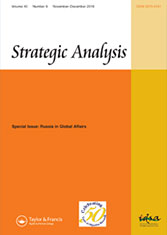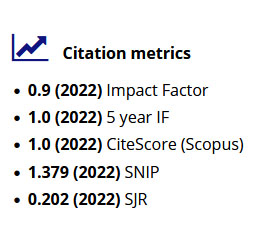Strategic Analysis


Strategic Analysis is the bimonthly journal of the Manohar Parrikar Institute for Defence Studies and Analyses (MP-IDSA), New Delhi. It is published by Routledge, an imprint of the Taylor & Francis Group, United Kingdom.
For subscription and other details, please visit the Routledge website
The Journal provides a forum for independent research, analyses, and commentaries on national, regional and international security issues that have policy relevance. It seeks to promote a better understanding of Indian thinking on contemporary national and international themes. The Journal reflects a diversity of views from the strategic and international relations studies community both from within and outside India. The flagship in the IDSA stable of publications, Strategic Analysis began as a monthly journal in April 1977 and served as a medium for publishing commentaries on current events. From early 1987, its contents came to include both research articles as well as commentaries on national and international developments. It was transformed into a quarterly, refereed, journal in 2002. Routledge has been publishing the journal in a bi-monthly format since January 2007.
Scholars and analysts are welcome to submit well-researched papers for publication in this refereed journal.
Submissions should be directed to Mr. Vivek Kaushik, Associate Editor at vkaushik.idsa@nic.in
Guidelines for contributors [+]
Current Issue: November-December 2024
A decade after Strategic Analysis published its landmark Special Issue ‘Arctic: Commerce, Governance, and Policy’ (2014, 38:6), the region has transformed in ways few could have fully anticipated. This Special Issue offers a timely and thought-provoking re-engagement with the Arctic’s evolving realities. At the heart of this compendium lies the recognition that the Arctic is not merely melting—it is being remade. Climate change, economic ambitions, and national interests now collide in a space once considered isolated, creating a new geopolitical theatre defined as much by its fragility as by its strategic significance.
The collected essays unpack this transformation by engaging with four urgent and interrelated questions. First, what are the emerging threats and vulnerabilities faced by Arctic States, particularly amid rising geopolitical tensions? Second, is there still space for cooperation, and under what conditions might stability return to the High North? Third, how have recent events and evolving power dynamics reshaped the regional order? And finally—perhaps most crucially—what decisions must be taken today to steer the Arctic toward a future of innovation, sustainability, and shared responsibility?
This Special Issue is not just a reflection—it is a call to rethink the Arctic’s place in global affairs, and to act with foresight in a region where the stakes are rapidly rising and the margins for error are vanishingly small.



